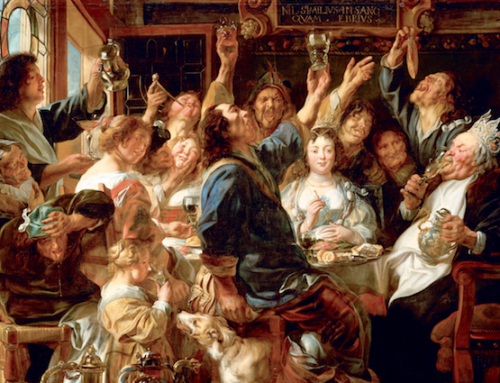Those who truly seek to bring about the good also have to be ambitious for power, just not for their personal satisfaction, but for the greater good; they need to “baptize” their strong personal drive and accept power when it comes so that they can root out mediocrity and accomplish what actually needs doing…
 On Monday of this week, after the solemn ceremonies of Convocation and Matriculation on Sunday afternoon, each class of students gathered for at least an hour—the freshman for a full three hours with Dean Jason Baxter—to hear about our hopes for the year ahead and get some practical advice as well. On Monday night, I had occasion to speak to this year’s seniors about ambition, this drive, this fierce desire for accomplishment with a vexed history and complicated attraction. The very word is charged. Mark Antony, in Shakespeare’s Julius Caesar, defends his murdered friend against the allegation that he was “ambitious,” but in the very defense, he implicitly concedes that ambition is a fault. In Caesar’s case, it was ambition for more and more personal power at the expense of the Roman Republic, and Antony counters the charge by showing how much Caesar loved the people by giving them money (not exactly a refutation).
On Monday of this week, after the solemn ceremonies of Convocation and Matriculation on Sunday afternoon, each class of students gathered for at least an hour—the freshman for a full three hours with Dean Jason Baxter—to hear about our hopes for the year ahead and get some practical advice as well. On Monday night, I had occasion to speak to this year’s seniors about ambition, this drive, this fierce desire for accomplishment with a vexed history and complicated attraction. The very word is charged. Mark Antony, in Shakespeare’s Julius Caesar, defends his murdered friend against the allegation that he was “ambitious,” but in the very defense, he implicitly concedes that ambition is a fault. In Caesar’s case, it was ambition for more and more personal power at the expense of the Roman Republic, and Antony counters the charge by showing how much Caesar loved the people by giving them money (not exactly a refutation).
For our students, who study such works, the problem with ambition is likely to be that it smacks of secularism and corruption, which Bishop Robert Barron characterized this morning in his daily gospel reflection as “the world of Tiberius and Pilate and Herod and Caiaphas.” In a sense, the whole of a Catholic liberal arts education like ours constitutes an inoculation against, say, the unexamined ambition to make lots of money. It’s difficult to imagine one of our students even thinking in those terms. Most of us steeped in the wisdom of Socrates and Jesus immediately think of the rich young man who went away mourning because he had many possessions. Why seek to make more than a sufficiency—why enter the world of business and entrepreneurial enterprise at all—if the ultimate fruit is this worldly sadness?
But as I pointed out to the seniors, my position as president has brought me into contact with many Catholic benefactors whose successful work in the world has made it possible for them to exercise the ancient virtue that Aristotle called liberality. As Fr. Schall describes it, liberality “means ruling our possessions with generosity so that we can use them for purposes of life, friendship, and openness. The liberal man is one who does not deny his relation to matter, but enjoys it and uses what he has to provide an atmosphere of superabundance and ease so that the higher things can happen in his world.” For Catholics who possess the baptized virtue of liberality, informed by the theological virtue of charity, that superabundance makes possible the great work in the world of many charities, many apostolates.
Without that liberality, without the ambition for the good that engaged these men and women in the noble enterprise of building up and running honest businesses, our college would not exist. The work of these dedicated Catholics not only provides needed goods and services, but it also gives work to many who experience firsthand the faith of those who lead them. Moreover, the profits of their businesses do not go for mere pleasures of the world or the trendy causes of the miseducated, but for what is genuinely worthwhile. Not only is there nothing wrong with “good profit,” as Tim Busch, founder of the Napa Institute, describes it, but this kind of profit should be the positive ambition of young men and women who know that their gifts are providentially fitted for success in the business world. They will make a telling difference, as Fr. Robert Sirico does with the Acton Institute, for our embattled Church in the hard decades to come—if they have enough spirited ambition.
But what about ambition for power like Caesar’s? Lord Acton’s famous sentence about the corruption that follows upon power rings in our ears. If it has such a bad effect, isn’t there something wrong with power per se—something amiss, for any Christian, in the Nietzschean “will to power”? In other words, when someone wants it, isn’t he or she seeking the very dubious satisfaction of having others under their control? I think of Tolstoy’s The Death of Ivan Illych, where the title character enjoys precisely this satisfaction in being an examining magistrate. He feels “that everyone without exception, even the most important and self-satisfied, was in his power, and that he need only write a few words on a sheet of paper with a certain heading, and this or that important, self-satisfied person would be brought before him in the role of an accused person or a witness.” He does not exercise his power malignantly, but he very much enjoys having it nonetheless. And what of those who do exercise it malignantly, like the tyrants so scathingly exposed in Plato’s Republic or Shakespeare’s Macbeth—or like the princes of the Church who use their power over others for their own private lusts?
Should our graduates not, therefore, shun power? Should they not hide themselves from occasions of its exercise and seek out the humblest of positions? My wife and I were privileged to have as both a teacher and a close friend Dr. Louise Cowan, a famed teacher of literature at the University of Dallas and a major figure in the revival of the Catholic liberal arts tradition, and I remember once when someone in her presence disparaged power along these lines. She answered with a kind of ferocity. She told us that it was cowardly to eschew power. Why? Because only with power could you get anything worthwhile done.
Those who truly seek to bring about the good also have to be ambitious for power, just not for their personal satisfaction, like Ivan Illych, but for the greater good; they need to “baptize” their strong personal drive and accept power when it comes so that they can root out mediocrity and accomplish what actually needs doing.
In her thought on this matter, Dr. Cowan drew upon the great teaching of Romano Guardini (one of the primary influences on Benedict XVI), who argues in Power and Responsibility that man’s spirit is free to choose to use power for evil, but also free to use his divinely given sovereignty over the world to bring about the good. “Power awaits direction,” writes Guardini. To leave power to the venal and wicked out of supposed “high-mindedness” is to concede the triumph to evil forces only too happy to take it.
I’ll have more to say next week about ambition for honors—and especially for fame—and the special ambition for truth and holiness.
Republished with gracious permission from the Wyoming Catholic College Weekly Bulletin (August 2018).
The Imaginative Conservative applies the principle of appreciation to the discussion of culture and politics—we approach dialogue with magnanimity rather than with mere civility. Will you help us remain a refreshing oasis in the increasingly contentious arena of modern discourse? Please consider donating now.







It was a very interesting discussion, it is true that sometimes we have a puritanical tendency to condemn even the right use of “wordly things” like power, money, and fame.
However, I must ask in a rather cliché fashion the obvious socratic question: what is power?
You just said that it is possible to desire power in a healthy way, but in doing so, I felt that it was implicitly conveyed that power is essentially of an economic or political nature.
It need not to be so. I believe that true power is nowhere to be found more present, or strongly manifested, than in the person of a saint.
True saints, mystics, sages, and prophets carry in their words a greater power than that of the businessman or of a politician, against what our materialistic age would like to believe.
I too think that material power should be baptized, but keeping in mind that the main way to change the world is to live the life we were called to live. If we lived our vocation authentically, we would set the world on fire.